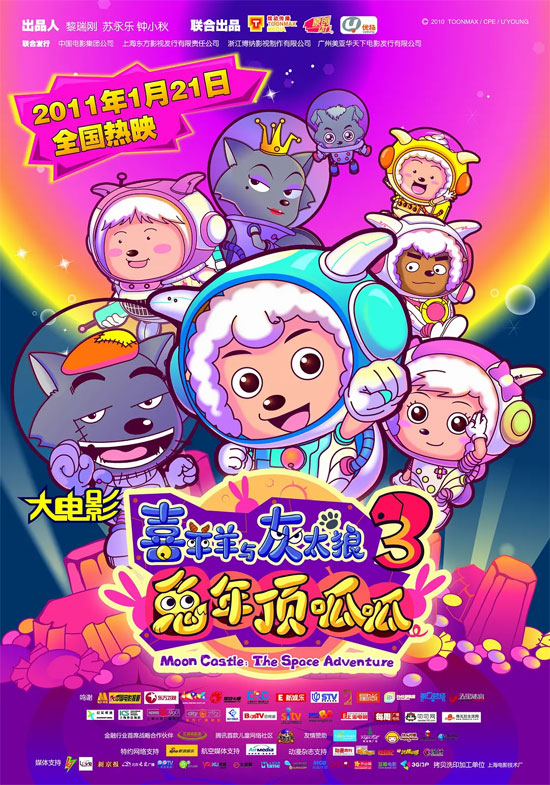Film Name: 喜羊羊与灰太狼之兔年顶呱呱 / Moon Castle: The Space Adventure

The most bizarre viewing experience created by the “Pleasant Goat and Big Big Wolf” series is that children watch Pleasant Goat while adults watch Big Big Wolf. Everyone gets what they want, each with their own preferences.
While children cheer for Pleasant Goat’s bravery and wit, adults are clearly more drawn to scenes where Big Big Wolf races with tears brimming with bitterness. When kids dream of swapping places with the little sheep to enter that fantastical candy world, grown-ups chuckle at Red Wolf’s dual nature—wielding a violent frying pan yet radiating tender devotion to her husband.
Thus, the conflict between Pleasant Goat and Big Bad Wolf isn’t merely a clash between two opposing species, but a collision of two worldviews: children striving to study diligently while occasionally rebelling against adults, embodying a rebellious spirit; and adults who, while constantly restricting children’s space, also lead private lives unknown to their young.
This is the core of Pleasant Goat’s aesthetic—and what sets it apart from other children’s animations and conventional domestic cartoons. Why does the theatrical version consistently feature Pleasant Goat and Grey Wolf teaming up to defeat a common enemy, without audiences feeling any discomfort? Because they aren’t natural enemies at all—they represent two distinct groups.
“Moon Castle: The Space Adventure” takes this duality of separation and unity to its pinnacle. It flawlessly portrays children’s dreams—dreams of heroes, dreams of magic, dreams of other worlds—while humorously depicting an adult couple’s love story, parting sorrows, and daily routines. It allows both audiences to find points of interest and resonance. Achieving this is no small feat.
Little Gray is a pivotal character in the Pleasant Goat theatrical film series. His significance lies not in extensive screen time or numerous lines, but in how he embodies the film’s overarching aesthetic. You’ll notice Little Gray is as adorable as a lamb, often hanging out with the sheep, and shares a particularly close bond with Lazy Sheep. At its core, Xiao Huaihuai is essentially a sheep. You’ll notice that Grey Wolf and Red Wolf, as parents, have essentially raised a sheep in wolf’s clothing. Its presence serves to demonstrate that the adult generation, the parents, still harbor considerable affection and care for the younger generation. This dynamic helps balance the relentless conflict between the wolf parents and their sheep offspring. Xiaohuaihua serves as a bridge between Grey Wolf and Happy Sheep. The affectionate care he receives from the older generation acts as a key for the children to identify with their elders, while his cuteness also serves as a key for the elders to identify with the children.
In this sense, the appearance of Happy Lamb’s biological parents in this film is actually redundant. Throughout previous Happy Lamb storylines—whether in TV episodes or movies—its parents have never physically appeared, yet they are ever-present in spirit. Their true representatives are none other than Grey Wolf and Red Wolf. Why do I say this? Notice this detail: on the Green Grass Prairie, aside from the grandfatherly Slow Sheep, all the inhabitants are young lambs. The parents of these lambs are collectively absent. The Sheep Sheep animation essentially creates a psychological game by separating the parental generation from both the children and grandparents, positioning them as opposites. Otherwise, you cannot explain this collective absence of parents in the world-building: Can you really claim all the lambs’ parents are scientists on missions to other planets? Therefore, introducing the perfect parents of Pleasant Goat—a scientist and a pop star—into this theatrical film actually disrupts the worldview of the series. Parents were never portrayed as perfect in Pleasant Goat’s world; why go out of your way to make them perfect?
Anyone who dismisses Pleasant Goat as childish or merely a cartoon for little kids fundamentally misunderstands its worldview and aesthetic. Admittedly, the character of Pleasant Goat is designed for children—he is pure, adorable, lively, kind, and wise, embodying various educational virtues. But Grey Wolf is not intended for children; he is a character designed for adults. He is multifaceted, prone to violence, has an emotional life, and holds clear views on marriage—aspects children simply cannot fully grasp.
I believe there are clear criteria for determining whether a film is purely for children: Does it feature characters with rounded personalities (rich, multifaceted, or embodying the unity of opposites)? Are characters ever placed in moral dilemmas (where no decision is entirely perfect, forcing them to make difficult choices)? And do characters face consequences for their actions? If a film possesses any of these elements, it transcends being mere children’s entertainment.
Moon Castle: The Space Adventure demonstrates greater maturity compared to the first two theatrical releases of Pleasant Goat, particularly in its more thorough and distinct expression of its own aesthetic. Moreover, the story incorporates more humorous elements and social-cultural references, even leveraging the patriotic backdrop of the Chang’e-2 lunar mission.
Apart from a slightly drawn-out segment where Pleasant Goat and the Magic Rabbit wander aimlessly in a tree hollow, the film overall boasts a crisp pace, climactic moments, witty dialogue, gorgeous visuals, rich imagination, outstanding music, and thought-provoking content. Therefore, I believe it is no exaggeration to hail it as one of the most polished works in Chinese animation over the past two decades.
Please specify:Anime Phone Cases » Moon Castle: The Space Adventure 2011 Animation Film Review: The Aesthetics of Pleasant Goat